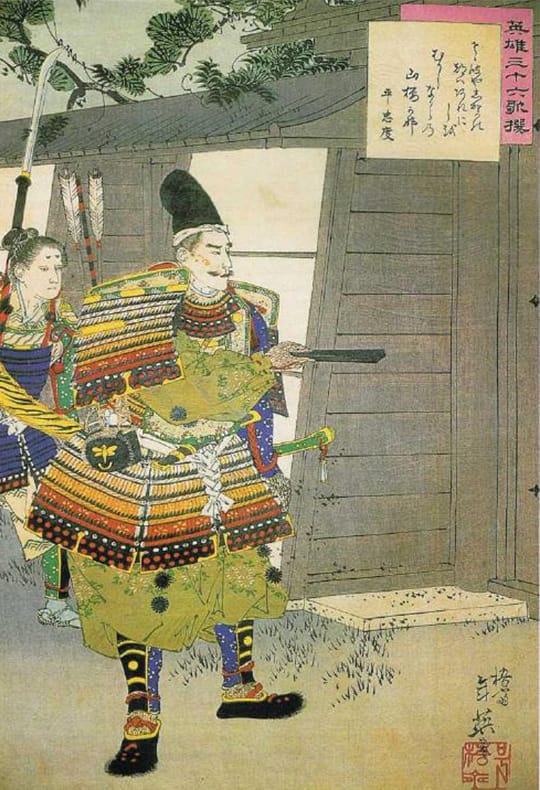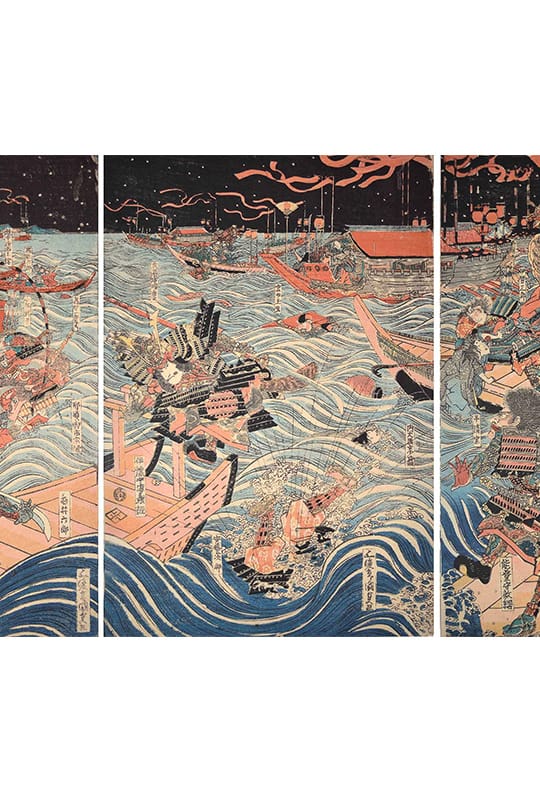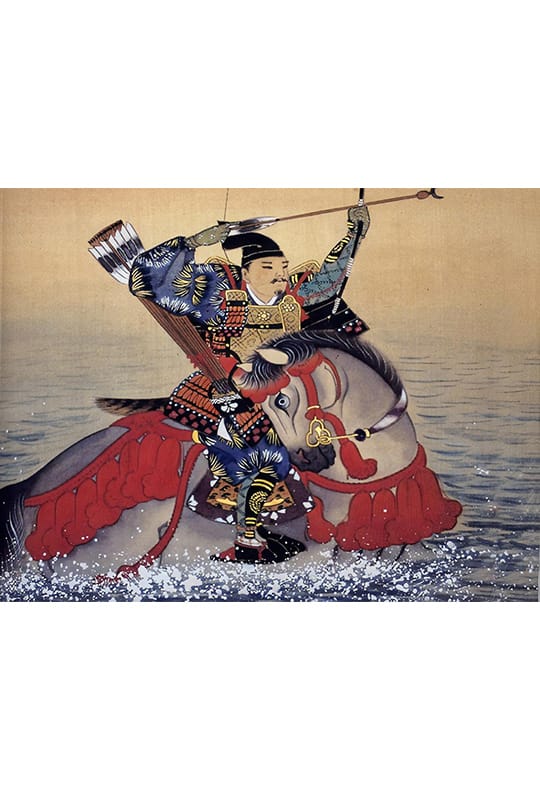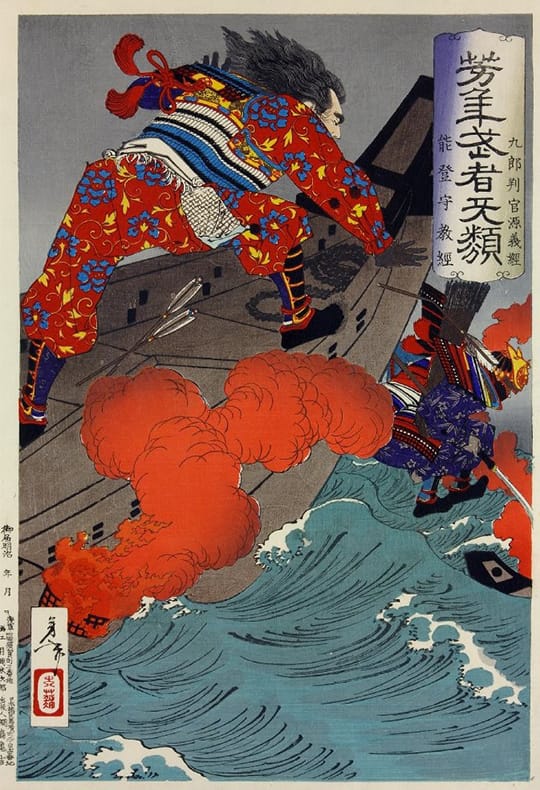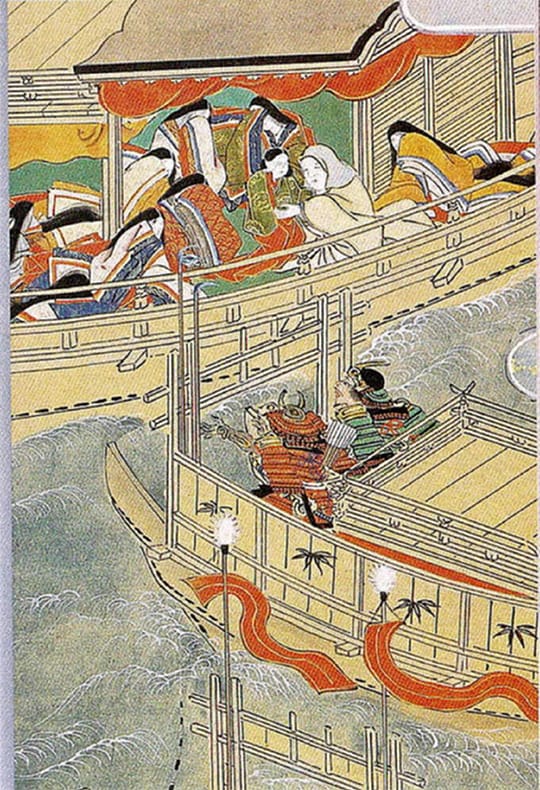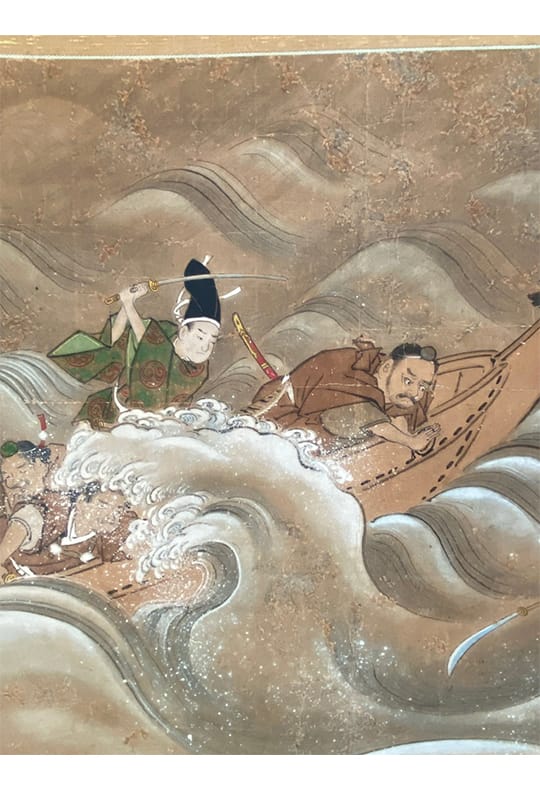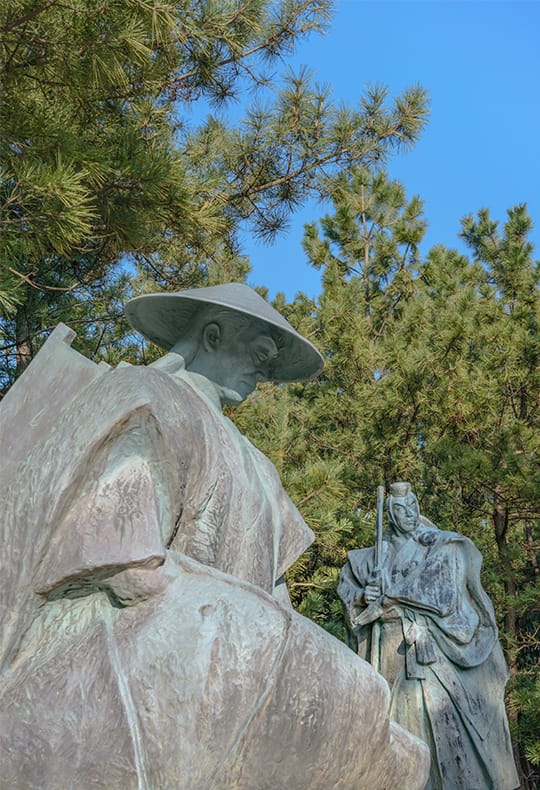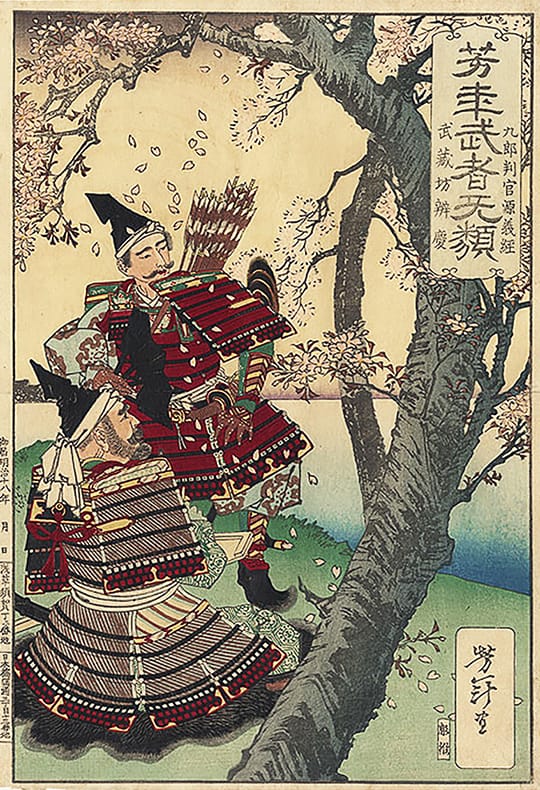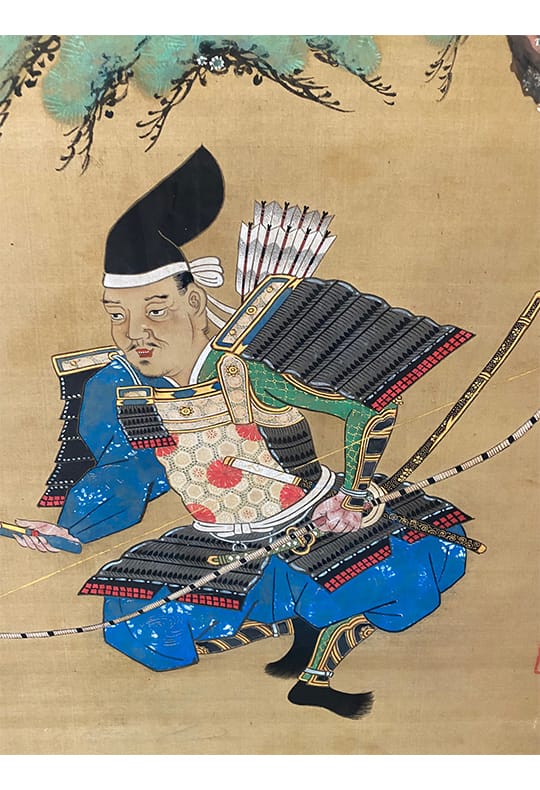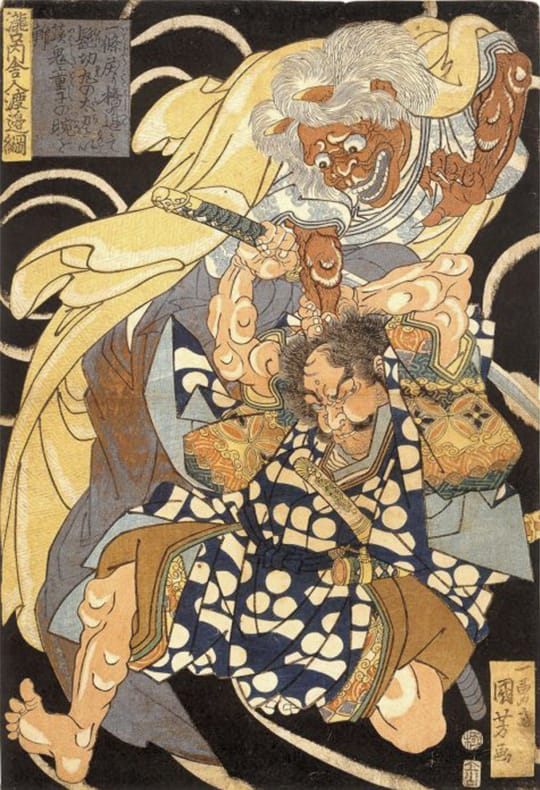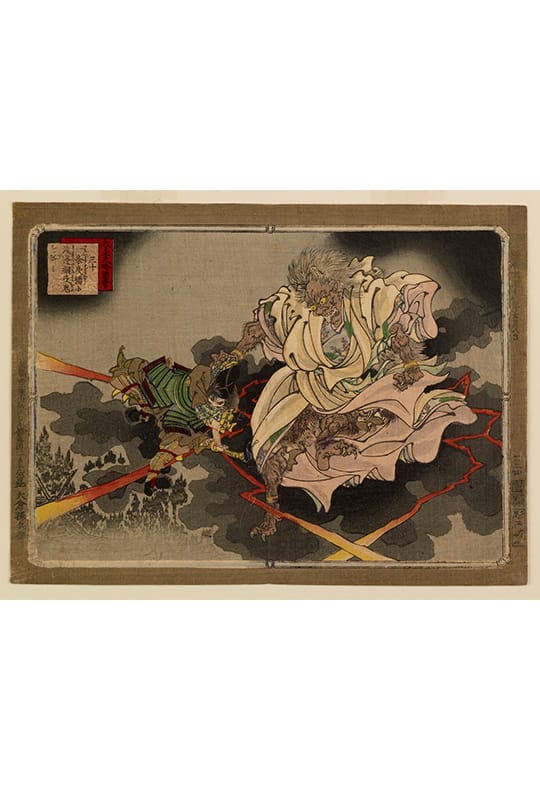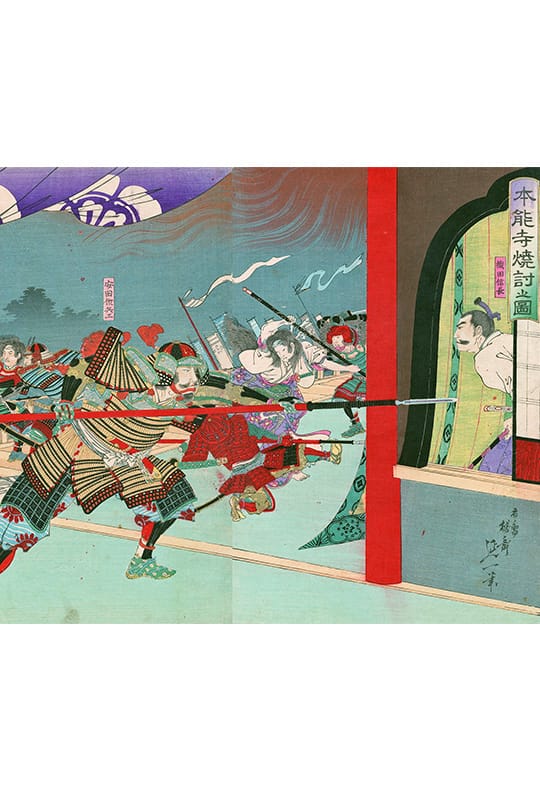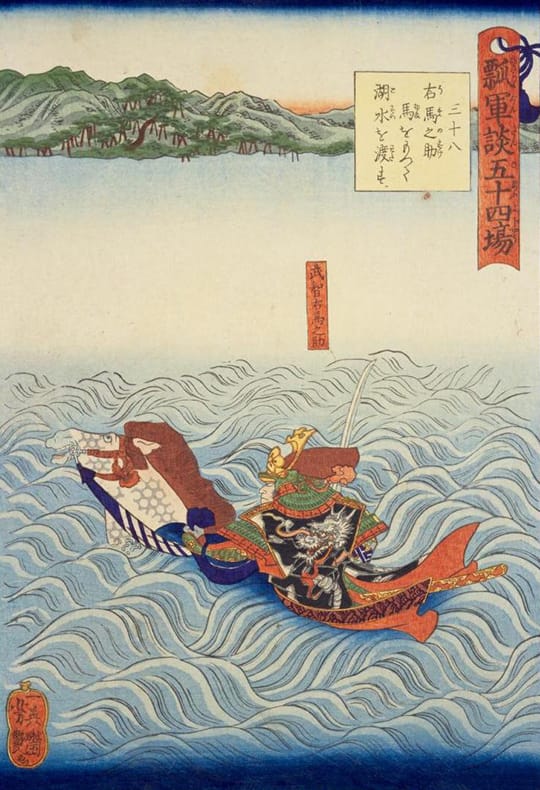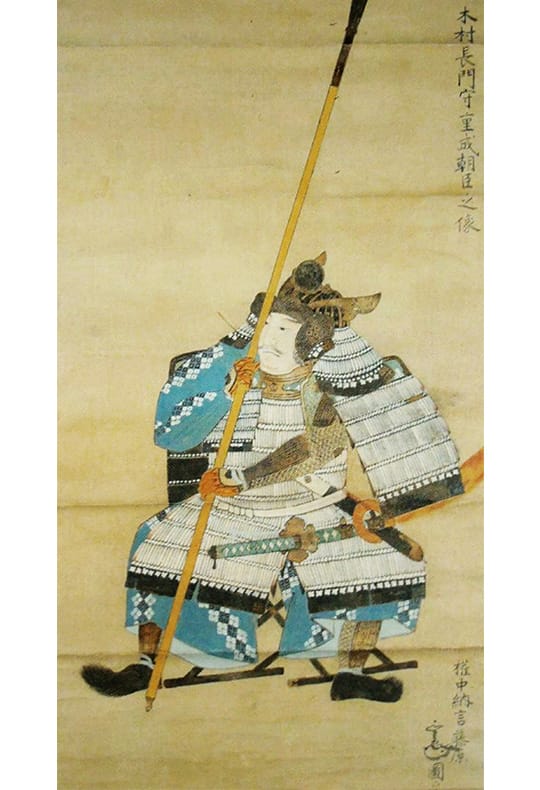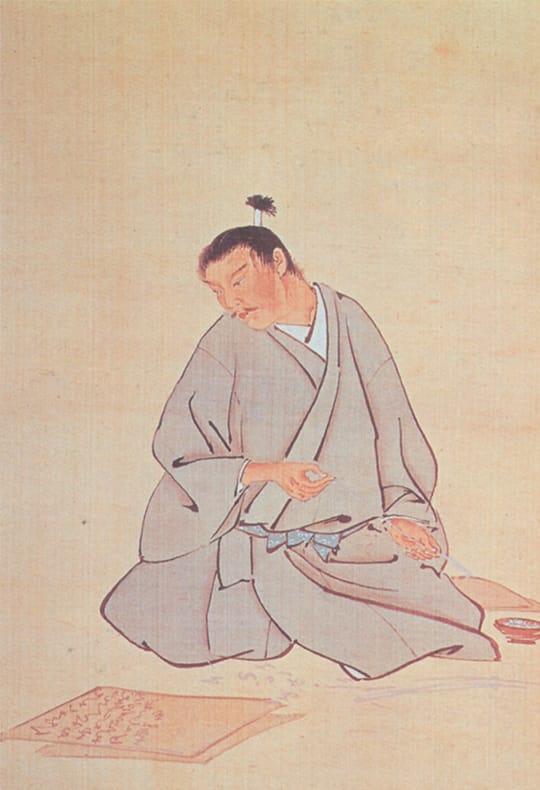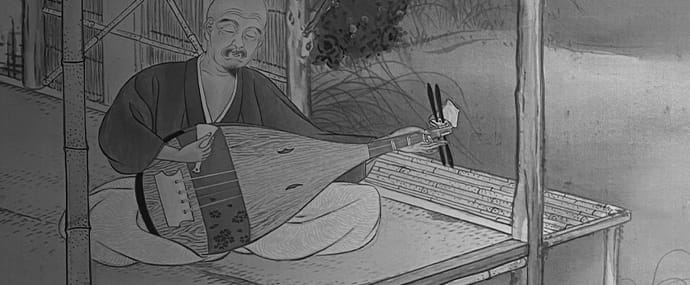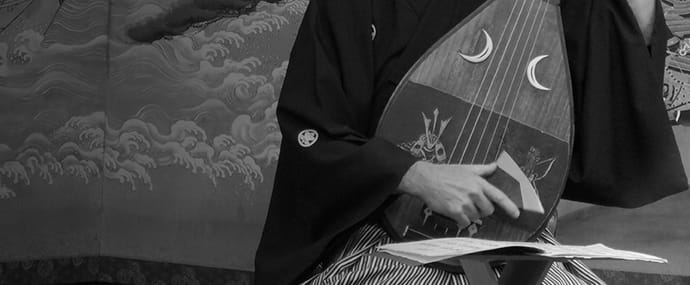The Tale of the Heike-search
Kyoto-search

kumagai to atsumori
熊谷と敦盛
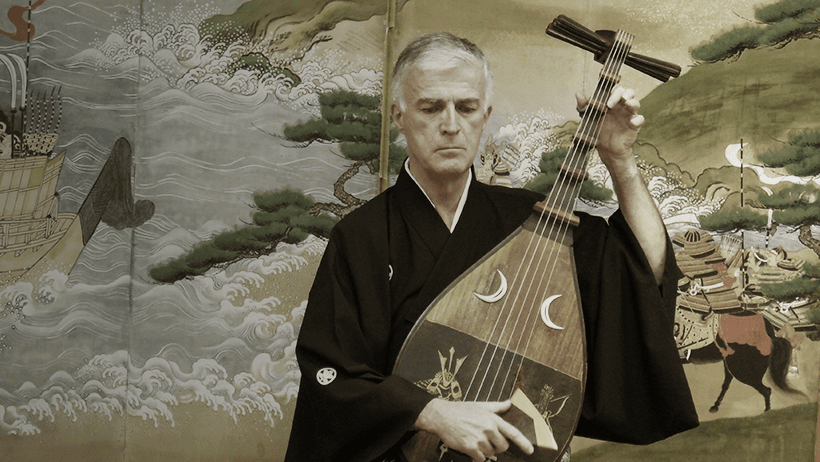
Introduction
On March 20th 1184, a famous battle between the HEIKE and the GENJI armies (TAIRA and MINAMOTO) took place in an area west of present-day Kobe, called Ichinotani. The story of this battle, which brought victory to the GENJI, is depicted in the Heike monogatari (The Tale of the Heike). The best-known episode is the fight between the GENJI warrior, KUMAGAI Naozane, with Atsumori, the HEIKE knight. After a short struggle, Naozane realizes that his opponent is a mere boy, the same age as his own son. Overcome with the pain of ephemerality, he renounces the world and becomes a monk.
This moving story was repeated in many other genres and works of literature in the following centuries. We find it dramatized in the Noh-play Atsumori, in a kōwakamai piece by the same title, while in the jōruri and Kabuki repertoire, this same story has been titled Ichinotani futaba gunki. It was even used as a shōka, or song, in early 20th century schoolbooks; this song is still popular even today. It is also known as Aoba no fue, which was also the former title of this ballad. Some forty years ago, however, the poetic title of Aoba no fue (The Flute ‘Green Leaves’ ) had to be changed for copyright purposes to Kumagai to Atsumori.
According to the Azuma kagami (13th c.), KUMAGAI lost a lawsuit in a real estate trial in 1192, after which he renounced his status as a warrior and later fled to the West to become a disciple of Hōnen. The chikuzen biwa ballad only loosely follows the chapter from the Tale of the Heike and in an extremely romantic and poetic way. Most notable is the exquisite scene of KUMAGAI listening to Atsumori playing the flute, which is the recasting of the original in which KUMAGAI utters after having killed Atsumori:”Ah, how pitiful! He must have been one of the people I heard making music inside the stronghold just before dawn.“
In the original tale, the brief exchange with the GENJI warrior shows Atsumori to be brave and very proud before he succumbs to KUMAGAI. In this ballad, however, this passage is KUMAGAI’s sentimental apology for a meaningless death by his hand.
Synopsis
The ballad opens at night as the HEIKE soldiers rest in their camp at the Bay of Suma, close to present-day Kobe. KUMAGAI Naozane has advanced early in order to be the first in the attack of the HEIKE. The moon shines and all is quiet except for the calm waves at the sea-shore. From the enemy camp, Naozane suddenly hears the wonderful sounds of a flute and is moved when he realizes that the noble HEIKE have brought their instruments to the battlefield to distract themselves with music from the fears of inevitable death.
Early next morning, the GENJI warriors, led by Yoshitsune, attack the still sleeping HEIKE and wreak havoc as the bewildered HEIKE warriors try to reach their ships lying in the bay. In this turmoil, Naozane seeks a worthwhile adversary, and spots a warrior clad in stunning armor trying to reach his ship. He calls to him, telling him that it is a shame to show one’s back to an enemy. The warrior, Atsumori, responds and rides back on his horse. A short struggle ensues, and the HEIKE warrior is quickly thrown to the ground and is at Naozane’s mercy. When Naozane looks in Atsumori’s face, he sees a boy of sixteen, and immediately feels how senseless it would be to take his life: no side stands to win this war with his death. He helps Atsumori to his feet and considers letting him escape. But then, realizing he could be suspected of treachery, he acknowledges that he has no choice and, with tears in his eyes, he cuts off the head of this young warrior.
Then, when removing Atsumori’s armor, he finds a flute, and recollects the beautiful flute playing he heard the evening before, which deepens his sorrow. Moved with his desire to pray for Atsumori’s soul for the rest of his life, he determines to leave the battlefield, travel to Kyoto and become a monk.

Lyrics
-
1. When I consider Eines Ritters
Mononofu no 武夫の
-
2. the vicissitudes of a warrior’s life, Lebensgang betrachtend
ui tenpen o kanzureba 有為転変を観ずれば
-
3. they are but dreams and illusions. schaut man Traumgebilde nur;
yume maboroshi no gotoku nite 夢幻の如くにて
-
4. No, even more transient than a dream! noch nichtiger als Träume ist das Kriegerleben!
yume yori mo nao hakanakere 夢よりも尚儚なけれ
-
5. And thus, KUMAGAI no Jirō Naozane Nun denn, KUMAGAI Jirō Naozane
satemo KUMAGAI no Jirō Naozane wa 偖も熊谷ノ次郎直実は
-
6. fought in the battle of Ichinotani schlug sich in der Schlacht von Ichinotani
Ichinotani no kassen ni 一の谷の合戦に
-
7. like no other hero. wie kein anderer Kämpe.
appare tegara tatenzu to 天晴手柄立てんずと
-
8. He went ahead of his troops Eine Vorhut führt er heute an
mikata no sei ni sakigakete 味方の勢に魁けて
-
9. accompanied by his son Kojirō Naoie mit seinem Sohn Kojirō Naoie
waga ko Kojirō Naoie to 我が子小次郎直家と
-
10. and one retainer. und einem einzigen Gefolgsmann.
hoka ni rōtō hitori o gushi 外に郎党一人を具し
-
11. Only three warriors were they, Nur drei Reiter sind sie,
koma o hayamete tada sanki 駒を速めて唯三騎
-
12. reaching early the Bay of Suma. die nach Suma eilen, hin zur Bucht.
Suma no ura ni zo tsukinikeru 須磨の浦にぞ着きにける
-
13. On the 6th day of the 2nd month, the 1st year of Genryaku (1184), Es ist das erste Jahr von Genryaku (1184);
koro wa Genryaku gannen kisaragi no 頃は元暦元年如月の
-
14. a night in early spring, noch ist es Vorfrühling – der 6. Tag des 2. Monats.
haru mada asaki muika no yo 春まだ浅き六日の夜
-
15. the moon was shining into the camps’s courtyard Als es Abend wird, da leuchtet in die Lagerfestung hell der Mond,
tsuki fukewataru shiro no uchi 月更け渡る城の内
-
16. where the HEIKE had pillowed their heads on their shields, wo HEIKE-Ritter auf den Schilden ruhen,
tate o shitone ni HEIKE gata 楯を褥に平家方
-
17. motionless and quiet. reglos, ohne einen Laut.
tada seki to shite koe mo naku 只寂として声もなく
-
18. The only sounds heard this evening Zu dieser Stunde hört man
kikoyuru mono wa yomosugara 聞ゆるものは夜もすがら
-
19. were the waves lapping the shore. nur die Wellen, die ans Ufer schlagen.
iso utsu nami no oto bakari 磯打つ浪の音ばかり
-
20. Naozane calmed the pace of his horse Ruhig wird der Schritt des Pferdes,
Naozane koma o shizushizu to 直実駒を静々と
-
21. and faced the shore als Naozane zur Küste reitet,
nagisa no kata e ayumasete 渚の方へ歩ませて
-
22. to rest a while. But then, suddenly, um ein Weilchen auszuruhn. Auf einmal,
shibashi yasurō orishi mo are 暫し休らふ折しもあれ
-
23. far from the castle yonder drüben von dem Schloss her,
haruka ni shiro no kanata yori 遥に城の彼方より
-
24. somebody played the flute; hört er Flötenspiel –
taga fuku fue ka kuretake no 誰が吹く笛か呉竹の
-
25. a wonderful melody was heard. vernimmt berückend schöne Klänge.
fushi ito tae ni kikoyunari 節いと妙に聞ゆなり
-
26. The sounds pealed through the air like jeweled-bells, Wundervolle Weisen hallen
reirō takaku sayuru ne wa 玲瓏高く冴ゆる音は
-
27. like the call of a deer in the moonlight wie der Ruf des Hirschs im Mondlicht,
tsuki ni ojika no naku koe ka 月に男鹿の啼く声か
-
28. or a wild goose’s cry as it traversed the blue skies, wie der Ruf der Wildgans, wenn sie in die Ferne zieht.
misora o wataru karigane ka 深空を渡る雁がねか
-
29. rustled with the breeze in the seashore’s pines Die Flötenklänge sind im Gleichklang mit der Brise in den Küstenkiefern,
iso nare matsu no kaze ni washi 磯馴松の風に和し
-
30. and sang of world weariness. singen von dem Leid der Welt.
aware o sasou shirabe nari 哀れを誘ふ調べなり
-
31. Listening to these sounds Als Naozane diesen Tönen lauscht,
Naozane mimi o sobadatete 直実耳をそば立てゝ
-
32. Naozane was deeply moved: da ist er tief bewegt:
kōzen to shite itarishi ga 恍然としてゐたりしが
-
33. “Well, the HEIKE warriors „Ja, diese HEIKE–Leute
sate mo HEIKE no hitobito wa さても平家の人々は
-
34. care naught for the following day. kümmert nicht das Morgen.
asu o mo shirenu inochi o ba 明日をも知れぬ命をば
-
35. They listen to an elegant flute, Edel geben sie dem Flötenspiel sich hin
miyabigokoro ya fuetake ni 雅心や笛竹に
-
36. taking joy in its noble sounds. und freuen sich an reinen Klängen.
fuki sumashi taru yukashisa yo to 吹き澄ましたる床しさよと
-
37. How profound my feelings are.” Das geht mir zu Herzen.“
itaku kan ni zo utare keru いたく感にぞうたれける
-
38. As time passed, the moon In der vorgerückten Stunde,
kakarishi hima ni tsukikage mo かゝりし暇に月影も
-
39. reached the western mountains als der Mond im Westen sich den Bergen nähert
nishiyama no ha ni katamukite 西山の端に傾きて
-
40. and dawn quietly filled the shallows of Akashi. und es in der Bucht von Akashi schon dämmert,
yo wa honobono to Akashigata 夜はほのぼのと明石潟
-
41. On the sea, the fishboats’ torches flackern in der Morgenluft noch schwach
oki no namima no isaribi mo 沖の浪間の漁火も
-
42. grew dim, and in the morning breeze, die Fackeln auf den Fischerbooten.
itsu shika kiete asakaze ni いつしか消えて朝風に
-
43. the red and white flags mingled once again. Heftig wirbeln rot und weiße Flaggen wieder durcheinander;
akahata shirahata irimidare 赤旗白旗入り乱れ
-
44. The HEIKE and the GENJI raised their battle cries GENJI-Krieger, HEIKE-Krieger rufen auf zum Kampf
Genpei tagai ni toki o age 源平互に鬨を揚げ
-
45. and all fought desperately. und schlagen sich erbittert.
koko o sendo to tatakaishi ga こゝを先途と戦ひしが
-
46. In the end, the HEIKE were vanquished, Bald jedoch schon sind die HEIKE unterlegen,
tsui ni HEIKE wa uchiyabure 遂に平家は打敗れ
-
47. and retreated to the sea. fliehn hinaus aufs offne Meer.
umi o haruka ni shirizokikeru 海を遥に退きける
-
48. But then there was Atsumori, a warrior with no commission. Doch hier, der Ritter Atsumori ohne Rang, er sitzt in seiner Rüstung,
saruhodo ni mukan no tayū Atsumori wa 去程に無官ノ太夫敦盛は
-
49. He wore menacing yellow armor, and was die mit Bändern – grün wie frisches Laub – geflochten ist,
moegi odoshi no yoroi kite 萌黄縅の鎧着て
-
50. riding a gray colt, auf einem grauen Apfelschimmel;
renzen ashige no koma ni nori 連銭葦毛の駒に乗り
-
51. but nobody being with him, niemand ist an seiner Seite.
ontomo tsukō mono mo naku 御供仕ふ者もなく
-
52. He was just too late to join his men, Seine Leute sind davongeritten,
mikata ni okure tada ikki 味方に遅れ唯一騎
-
53. and set off to reach the ships on the open sea. und auch er will zu den Schiffen fliehen.
oki naru fune e to kokorozashi 沖なる船へと志し
-
54. When he moved away Als er sich zum Meer hin wendet,
ochiyuki tamō tokoro o ba 落ち行き給ふ処をば
-
55. Naozane saw him from afar. sieht Naozane ihn aus der Ferne,
Naozane haruka ni kore o mite 直実遥に之を見て
-
56. He raised his war fan and waved. winkt mit seinem Ritter-Fächer:
gunsen agete sashimaneki 軍扇あげて差招き
-
57. “Are you not a HEIKE general? “Seid Ihr nicht ein General der HEIKE?
ika ni HEIKE no ontaishō 如何に平家の御大将
-
58. Your ships have already departed Eure Schiffe haben sich schon weit entfernt,
mifune wa tōku hedatareri 御船は遠く隔たれり
-
59. you cannot flee! entkommen könnt Ihr nicht mehr.
yomo nogaresase tamō maji よも逃れさせ給ふまじ
-
60. Come back and fight Also kehrt zurück!” ruft Naozane,
kaesase tamae Naozane ga 返させ給へ直実が
-
61. with me, Naozane!” he shouted. “kämpft mit mir.”
kenzan sen to yobawattari 見参せんと呼はったり
-
62. Following the Path of Bow and Arrow, Dem Ehrenpfad von Pfeil und Bogen folgend
yumiya no michi no narai tote 弓矢の道の習ひとて
-
63. Atsumori knew that after hearing a challenge from a foe, weiß Atsumori, dass es
teki ga yobu koe kikinagara 敵が呼ぶ声聞きながら
-
64. to flee would be eine Schande wäre,
tatoe ochinobitaraba tote たとへ落延びたらばとて
-
65. a warrior’s shame. And so, sich dem Feinde zu entziehen.
bumon no haji to Atsumori wa 武門の恥と敦盛は
-
66. he instantly turned his horse, Deshalb reißt er schnell sein Pferd herum
yaniwa ni koma o tatenaoshi 矢庭に駒を立て直し
-
67. to face Naozane for a fight. und reitet in die Richtung von Naozane.
Naozane megakete kirikakaru 直実目がけて斬りかゝる
-
68. They briefly crossed their blades, Sie kreuzen kurz die Klingen,
shibashi shinogi o kezurishi ga 暫し鎬を削りしが
-
69. but then threw them away, werfen dann die Schwerter weg und ringen ohne Waffen,
uchimono sutete munzu to kumi 打物すてゝ無手と組み
-
70. and grappled until they fell into the lapping waves bis sie fast ins Wasser fallen.
namiuchigiwa ni dō to otsu 浪うち際にどうと落つ
-
71. and struggled to and fro. Bald ist einer oben – bald is es der andere;
ue o shita e to kaeseshi ga 上を下へと返せしが
-
72. The brave unmatched Naozane der unvergleichlich kräftige Naozane
gōyū musō no Naozane wa 豪勇無双の直実は
-
73. overwhelmed Atsumori easily. hat aber leichtes Spiel mit Atsumori.
nan naku Atsumori o kumishikite 難なく敦盛を組み敷きて
-
74. But when he was about to take his head Als er ihm jedoch den Kopf abschlagen will,
kubi o kakan to ukagaeba 首を掻かんと窺へば
-
75. he looked into the face of a sixteen year old boy, da schaut er einem 16 Jahre alten Jungen ins Gesicht –
toshi wa nihachi no chigo zakura 年は二八の稚児桜
-
76. a face like a cherry blossom just opening. ein blühend frisches Antlitz!
hokorobi someshi kanbase ni 綻び初めし顔に
-
77. Naozane, who could crush demons, Naozane – obwohl ein Teufelskerl –
oni o mo hishigu Naozane mo 鬼をも拉ぐ直実も
-
78. remembered his own son Naoie, denkt nun an seinen Sohn,
segare Kojirō Naoie to 忰小次郎直家と
-
79. and he lost his spirits. und damit schwindet ihm die Lust zu kämpfen.
omoikurabete ki mo yurumi 思ひ比べて気も弛み
-
80. ”To slaughter a young warrior of the same age „Einen jungen Krieger selben Alters
onaji toshiha no waka musha o 同じ年端の若武者を
-
81. brings no glory”, abzuschlachten, bringt mir keine Ehre“,
utte tegara mo nani ka sen 討って手柄も何かせん
-
82. he said to himself. sagt er still zu sich
toku toku otoshi mōsan to 疾く疾く落し申さんと
-
83. He helped him stand, und hilft dem Jungen auf die Beine,
idaki okoshite nengoro ni 抱き起こして懇ろに
-
84. even brushing the sand from his armor. schlägt ihm liebevoll den Sandstaub von der Rüstung.
suna uchiharai mairasuru 砂打はらひ参らする
-
85. But suddenly, there was the rumbling Doch was hört man! – rollen da nicht
orishimo are ya tōtō to 折しもあれやとうとうと
-
86. of the rousing war drum. Wirbel einer Kriegertrommel,
haya hikiage no jindaiko 早引揚げの陣太鼓
-
87. Between the pines around the bay it echoed, durch die Kiefern in die Bucht als Echoruf.
Isoyama matsu ni kodama shite 磯山松にこだまして
-
88. and from that side with battle cries, Von weither dringt ein Schlachtgeheul.
kachidoki agaru kanata yori 勝鬨あがる彼方より
-
89. DOI and KAJIWARA with some fifty horsemen, DOI und der KAJIWARA, Kopf an Kopf mit fünfzig Reitern
DOI KAJIWARA no gojū yoki 土井梶原の五十余騎
-
90. their bridles side by side, rapidly approached. preschen schnell heran.
kutsuwa narabete hasekitaru 轡並べて馳せ来る
-
91. Naozane’s chest rose in emotion: Naozane gerät in Wallung.
Naozane mune o odorasete 直実胸を躍らせて
-
92. “Is this heaven’s will? “Ist das eine Himmelsfügung?
aa ten naru kana mei naru kana あゝ天なる哉命なる哉
-
93. How can I help him?” he said. Wie denn kann ich ihm nur helfen!” ruft er in Verzweiflung
ika ni mo shite otoshimōsan to 如何にもして落し申さんと
-
94. “My heart is broken, but there is no other way. mit gebrochnem Herzen.
kokoro kudakishi kai mo naya 心砕きし甲斐もなや
-
95. If I let this gentleman flee “Falls ich diesen jungen Herrn hier laufen lasse,
kono kimi tasuke matsurinaba 此の君助けまつりなば
-
96. I will be suspected as traitor. gelt’ ich als Verräter.
nishin idaku to utagawaren 二心抱くと疑はれん
-
97. It may be painful for you, but Schmerzvoll wird es sein, doch bitte,
on’itawashū sōraedo 御痛はしう候へど
-
98. let me cut off your head. lass mir deinen Kopf.
mishirushi chōdai tsukamatsuri 御首頂戴仕り
-
99. I will pray for your soul.” Ich will für deine Seele beten!”
goshō tomurai mōsan to 後生弔ひ申さんと
-
100. And with one decisive stroke, Mit dem gut geführten Schwert geschlagen
omoikittaru hito tachi ni 思ひ切ったる一と太刀に
-
101. he cut the bud from its stalk, fällt die Blüte von dem Stengel,
tsubomi no hana o chirashikeri 蕾の花を散らしけり
-
102. When Naozane wird der Diamanten-Lebensfaden durchgeschnitten.
tama no o taeshi nakigara no 玉の緒絶えし亡骸の
-
103. loosened the dead boy’s armor and clothes Als Naozane das Unterkleid von Atsumori öffnet,
yoroi hitatare toki mireba 鎧直垂解き見れば
-
104. he found, wrapped in a brocade pouch, findet er in einem Beutel aus gewirkter Seide,
nishiki no fukuro ni tsutsumareshi 錦の袋に包まれし
-
105. the flute known as ‘Green Leaves’. eine Flöte, “Junges Laub” genannt.
aoba no fue zo sasaretari 青葉の笛ぞ差されたり
-
106. “Ha!” shouted Naozane in consternation, “Ha!” ruft Naozane tief erschrocken,
Naozane ha! to odorokite 直実ハッと驚き
-
107. last evening’s beautiful melody, “stammten jene wundervollen Klänge, die ich gestern hörte,
sate wa sakuya ryūryō to さては昨夜嚠喨と
-
108. of the exquisite flute, jene zauberhaften Flötenweisen
shirabe taenaru fue no ne wa 調べ妙なる笛の音は
-
109. must have come from this nobleman! wohl von diesem Edelmann –
kono kindachi nite owaseshi ka 此の公達にておはせしか
-
110. Naozane, without knowing that hätte ich doch das gewusst!”
sore to wa shirade Naozane ga それとは知らで直実が
-
111. he had mistakenly wielded his sword, Naozane erkennt nun seines Schwertes Fehl
yaiba ni kakeshi fukakusa yo to 刃にかけし不覚さよと
-
112. was choked with tears, und kann die Tränen nicht mehr halten,
seki kuru namida todome ezu せき来る涙とゞめ得ず
-
113. and fell into deep grieving. Trauer überwältigt ihn.
hitan ni koso wa kurenikere 悲歎にこそは暮れにけれ
-
114. Even the brave warrior’s heart Selbst eines alten Kämpen Seele
yatakegokoro no mononofu mo 矢竹心の武夫も
-
115. feels the vanity of this inconstant world. leidet an der Schalheit dieser Welt.
ukiyo no mujō o kanjiken 浮世の無常を感じけん
-
116. Naozane threw away arrow, bow and sword, Naozane wirft Bogen, Pfeil und Schwert von sich
yumiya mo tachi mo mononogu mo 弓矢も太刀も物の具も
-
117. and took the Three Folded Garment of the Lotus. und greift zum Mönchsgewand.
sutete kayō no mitsugoromo 捨てゝ荷葉の三つ衣
-
118. He took the name of Renshō, Er nimmt den Priesternamen Renshō an.
na mo Renshō to aratamete 名も蓮生と改めて
-
119. and in the Jakkō Jōdo Kurotani Temple, Dann zieht er in den Tempel Kurotani, in die Klause Jakkō Jōdo,
Jakkō Jōdo Kurotani no 寂光浄土黒谷の
-
120. he confined himself in Hōnen’s cell. wo er Hōnen’s Lehre folgt,
Hōnenbō ni tojikomori 法念坊に閉ぢ籠り
-
121. He prayed for Atsumori’s salvation um fortan nur für Atsumoris Heil zu beten –
Atsumori no goshō tomuraishi 敦盛の後生弔ひし
-
122. and felt sorrow in the very depths of his heart, übermannt vom Leid des Seins in dieser Welt,
kokoro no uchi koso aware nare 心の内こそ哀れなれ
-
123. and felt sorrow in the very depths of his heart. übermannt vom Leid des Seins in dieser Welt.
kokoro no uchi koso aware nare 心の内こそ哀れなれ
Notes
5. KUMAGAI Jirō Naozane…He was a warrior from the region of present-day Kumagaya City, Saitama prefecture. As a GENJI warrior, he fought in the Battle of Ichinotani. 6. Ichinotani…This name refers to a valley close to present-day Suma in Kobe-city; however, the “Battle of Ichinotani” was not limited to this valley, but included the battlefield of Ikuta, now the center of present-day Kobe City, and other sites. 12. Bay of Suma …This bay of the Inland Sea is now the ward, Suma-ku, in Kobe-city. 40. The shallows of Akashi…Today, Akashi is a city in southern Hyōgo prefecture. 43. Red and white flags…The red flags belonged to the HEIKE troops, and the white to the GENJI. 48. Atsumori…TAIRA no Atsumori was the son of TAIRA no Tsunemori, the younger brother of TAIRA no Kiyomori, the head of the TAIRA clan. 62. Path of Bow and Arrow…The Path of the Warrior – i.e. a warrior’s ethics. 75. Sixteen years old…The age of the boy differs according to the source in question. In the Kakuichi Version of the Heike monogatari, he was seventeen, but in the Genpei seisuiki, he was sixteen. 89. DŌI and KAJIWARA…These are the names of the two warriors DŌI Sanehira and KAJIWARA Kagetoki. 105. The flute known as ‘Green Leaves’…In The Heike Tale this flute belonging to Atsumori is called “Small Branch”, but in the Noh play, Atsumori, it is called “Green Leaves” (aoba). 117. Three Folded Garment of the Lotus…This is a poetic word for a monk’s robe. 118. Renshō…Naozane’s name as a monk. It means “Life on a Lotus flower”. 119,1. Jakkō Jōdo…This is the name of the Buddhist realm where the enlightened beings dwell. 119,2 Kurotani…Originally, this name refers to a valley near the West Pagoda on Mt. Hiei. The priest, Hōnen (1133-1212) founded the Shōryū temple there, and was thus referred to as “the Priest of Kurotani”, and his lodge as “Hōnen’s Kurotani recluse”. When Hōnen later moved to the present Kurotani in Kyoto’s Higashiyama ward, his recluse was integrated into the Konkaikōmyōji temple complex. Nevertheless, the whole temple area is still popularly referred to as Kurotani or Kurodani. 120. Hōnenbō…Literally means the recluse of Hōnen, the founder of the Jōdoshinshū sect. It still exists — at least as a reconstruction — where Naozane is said to have resided after having taken Buddhist vows.
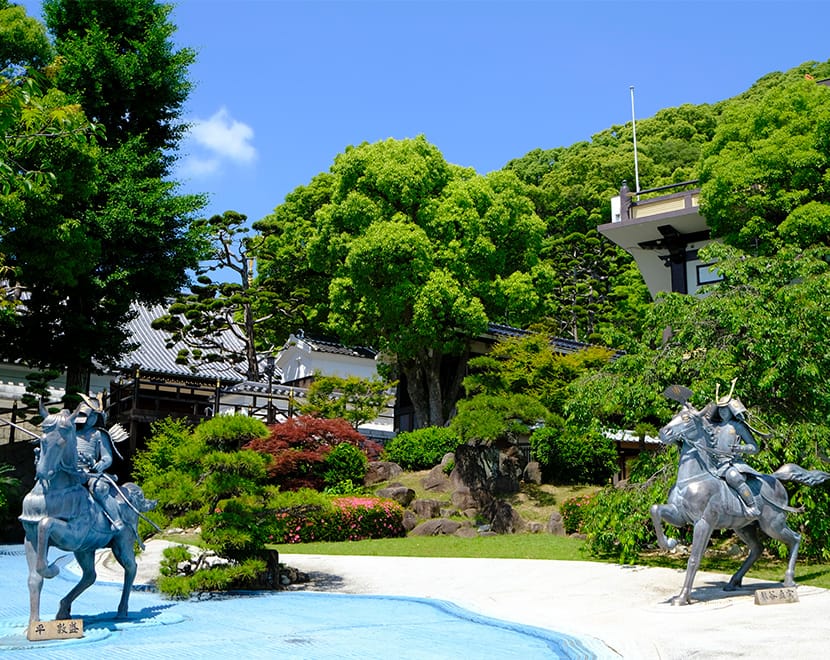
Music Notes
Kumagai to Atsumori is unquestionably among the most popular ballads for biwa performers. The plot is well known, and the core of the ballad, the death of a young and magnificent warrior, has always been moving.
It is not the story alone, however, which makes this piece so appealing. The text, rich with small episodes, lends itself to vocalization. The singer/player has numerous opportunities to display a wide expressiveness, and is thus challenged to polish each of these musical gems.
One aspect of this composition — three interludes and their symbolic meanings — must be discussed here, as they embody the remarkable quality of the musical setting for the entire ballad.
In the first scene, Naozane approaches the HEIKE- camp at night in order to be the first in the assault the following morning. This scene has a musical subject that allows for the stunning development of poetic momentum: Naozane’s hearing from afar the sound of a flute. He is deeply moved at the elegance of HEIKE soldiers pursuing musical beauty despite their awareness of inevitable death.
The flute is illustrated after line 25 by one of the most elegant biwa patterns known as Tamatsubaki, (Camellia). Underlying the charming purity of its melody is the connotation of death: with the flower’s withering, the blossom falls in its entirety, and thus resembles decapitation. This peculiarity is why the ominous camellia was never raised in a samurai’s garden. The Camellia pattern thus functions here as a premonition of the young warrior’s death.

Three lines later, which contain the highest vocal pitches, the flute is compared to the cries of wild geese as they cross the sky, after which the interlude, hakuren, (White Lotus), is performed. This interlude is musically peculiar in that there are several notes performed as brief tremolos; however, the pitch is manipulated, either raised or lowered through pressure on the string by the left hand. This is not seen in other interludes. When skillfully executed, this technique is very expressive and enhances the ethereal atmosphere of the entire passage. Here, too, there is a symbolic connotation; because the lotus is a symbol of purity — the lotus breaches a pond’s surface through murky waters, which symbolize the ugliness of the world — its spotless beauty shines like the Buddha, a being that remains pure despite having lived in the filth of this world. With this, it is possible to connect the interlude to Atsumori’s passing and his soul attaining buddhahood.
After Atsumori’s beheading and Naozane’s tears over his senseless death, the interlude after line 113 hints at the destiny of the samurai. The instrumental pattern is called Suisen (Narcissus) a flower symbolic for both its pure white color and its blooming in the early spring in defiance of the cold temperatures. But again, there is another deeper meaning: the narcissus can only be cut with a knife, the sturdiness of its stem making it impossible to be picked like other flowers. This detail again symbolizes the relationship of the samurai with blades.
